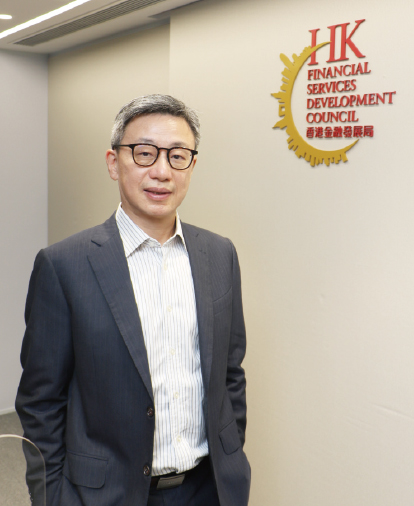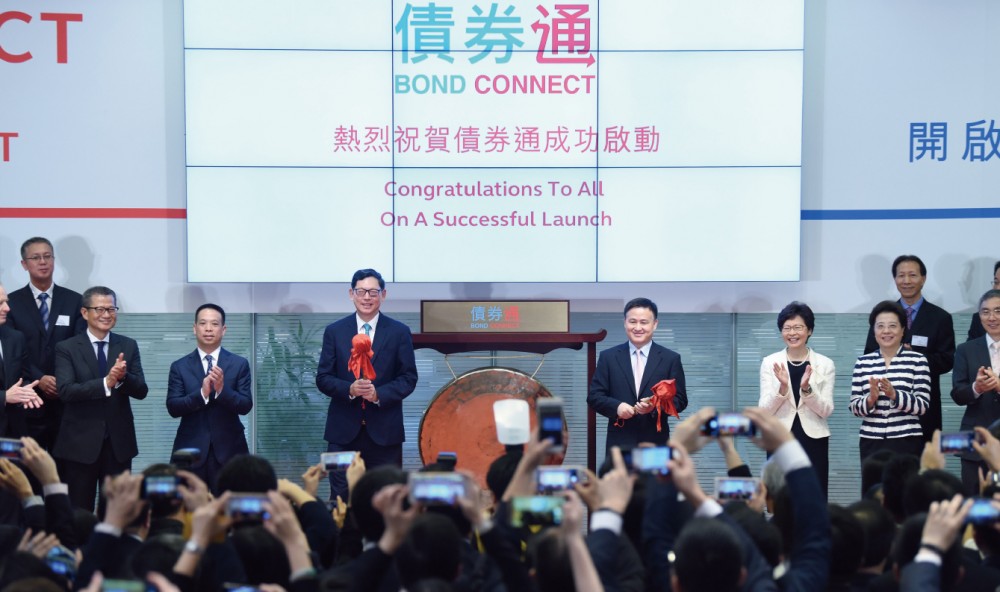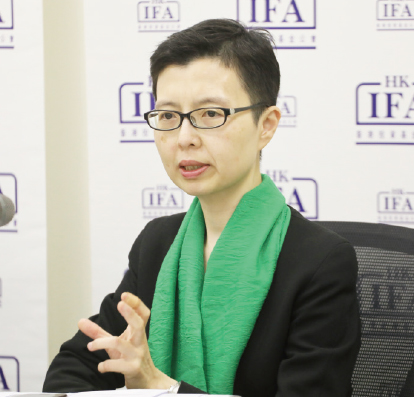In the future, through the Cross-boundary Wealth Management Connect (WMC), Mainland residents in the Greater Bay Area can invest in Hong Kong wealth management products, while Hong Kong residents can buy Mainland wealth management products. The Hong Kong financial sector generally welcomes the scheme as it believes it will help create huge business opportunities.

Au King-lun: Greater Bay Area Welcomes New Investment Setup
 Asset market connectivity mechanisms that link up the mainland and Hong Kong, including Stock Connect, Bond Connect and mutual recognition of funds, are gradually gaining market acceptance. Au King-lun, Executive Director of the Financial Services Development Council, believed the launch of the WMC will further provide Greater Bay Area residents with more diversified asset allocation options.
Asset market connectivity mechanisms that link up the mainland and Hong Kong, including Stock Connect, Bond Connect and mutual recognition of funds, are gradually gaining market acceptance. Au King-lun, Executive Director of the Financial Services Development Council, believed the launch of the WMC will further provide Greater Bay Area residents with more diversified asset allocation options.
Financial sector ready to take off
Au believed that banks will be one of the sectors to benefit directly from the WMC. “With their cross-boundary service capability, banks with Greater Bay Area branches or subsidiaries are expected to play an important role in the operation of the WMC.”
Over the past few years, more and more Hong Kong people are buying real estates in the Greater Bay Area and choosing to obtain their mortgage in a Hong Kong-based bank. Cross-boundary insurance may also be launched in the Greater Bay Area. Meanwhile, there is more room for development for local fintech startups. The increasing number of fintech infrastructure launches will significantly boost the exchange and cooperation between Hong Kong’s fintech sector and its mainland counterpart.
Optimizing the fund registration regime
 As for the fund sector, the market generally expects the WMC to begin with products that feature a clear and simple structure, including public funds and other products recognized by the Securities and Futures Commission of Hong Kong, and ranked low to medium risk by distributing banks. Au hoped that as the operation of the WMC advances, the investment scope could be gradually expanded to some Fund of Funds registered in Hong Kong and investing on Undertakings for the Collective Investment in Transferable Securities (UCITS) products that are recognized by the Securities and Futures Commission. Considerations can also be given to UCITS funds recognized by the Futures and Security Commission, as well as private wealth management products targeted for high net-worth and sophisticated investors in the long run.
As for the fund sector, the market generally expects the WMC to begin with products that feature a clear and simple structure, including public funds and other products recognized by the Securities and Futures Commission of Hong Kong, and ranked low to medium risk by distributing banks. Au hoped that as the operation of the WMC advances, the investment scope could be gradually expanded to some Fund of Funds registered in Hong Kong and investing on Undertakings for the Collective Investment in Transferable Securities (UCITS) products that are recognized by the Securities and Futures Commission. Considerations can also be given to UCITS funds recognized by the Futures and Security Commission, as well as private wealth management products targeted for high net-worth and sophisticated investors in the long run.
Au added that regulatory bodies in Hong Kong are actively optimizing the fund registration regime in recent years. For example, the registration method known as Open-ended Fund Company (OFC) was introduced two years ago. At the end of this past August, the “Limited Partnership Fund” (LPF) regime was introduced as an option for funds looking to establish in Hong Kong. More institutes that have plans to set up private equity funds in Hong Kong are expected to choose to set up an LPF directly.
“The implementation of the WMC is a progressive process. In the long run, it could include different types of funds around the world. The fund sector could ride on the convenience of registering and operating as an OFC or an LPF to get prepared.” More diversified registration and operation methods would attract more funds from different parts of the globe to tap into the Hong Kong market and seek business expansion.
Increasing demand for cross-boundary professionals
In future, the cross-boundary connection of green financial products may also be strengthened. As pointed out by Au, the mainland of China is currently the second largest green bonds market in the world. The relevant markets are expected to see continuous growth, thanks to the momentum given by national policies geared towards a sustainable economy. Hong Kong should further exert its function as a super connector and strive to become the green financial hub within the Greater Bay Area.
Au stressed that the WMC will unquestionably generate more new opportunities for the financial sector. However, when more international institutes are preparing to land in Hong Kong, their demand for professionals will also increase. “For example, the disciplines of law, accounting, risk management and sales require talents that are not only equipped with professional knowledge, but also suited for working on cross-boundary business. It is believed that with more frequent connection and communication in the future, there may be some breakthroughs in the mutual recognition of professional qualifications between Hong Kong and the mainland. This would create more career development opportunities for Hong Kong people.”

Sally Wong: Fund Industry Targets Business Opportunities in Greater Bay Area
 Besides providing more diversified investment and wealth management products for Greater Bay Area residents, the WMC also expands the investor base for financial institutions in the area. It is another major development in financial market interconnection between the two places.
Besides providing more diversified investment and wealth management products for Greater Bay Area residents, the WMC also expands the investor base for financial institutions in the area. It is another major development in financial market interconnection between the two places.
Sally Wong, CEO of the Hong Kong Investment Fund Association (HKIFA), said that as Mainland residents’ wealth continues to grow, their demand for diversified offshore asset investments will increase accordingly. “The rising per capita income of Mainland residents will lead to room for growth in financial investments, and the WMC fits this trend as its target is the general public.”
The Hong Kong fund industry eagerly awaits the WMC. According to the survey report jointly issued by the HKIFA and KPMG this year, fund companies have expressed great interest in the Greater Bay Area market. The official announcement of the WMC framework will help encourage the industry to speed up the formulation of specific development strategies.
The WMC provides an opportunity for Mainland residents to invest in overseas markets. “The WMC may become the first opportunity for many Greater Bay Area residents to invest overseas. For this reason, the list of funds to be included in the first phase of the WMC pilot is attracting attention from all sectors.”
Hoping for inclusion of SFC-approved funds
It has been reported that the initial implementation of the WMC will cover mainly simple investment products of relatively low risk. Wong hopes that when the WMC’s details are formally announced in the future, it can include funds approved by the Hong Kong Securities and Futures Commission (SFC). “SFC-approved funds are strictly regulated and the choices are diversified. If suitable funds can be included in the WMC as soon as possible, it can help Greater Bay Area residents build diversified investment portfolios and capture global investment opportunities.”
The WMC has a two-way interconnection mechanism, which means that Hong Kong residents can invest in Mainland investment products. Wong is not concerned that this will lead to competition, as from the perspective of investors, it is good to have more product choices in the market. Given the huge potential of the Mainland market, two-way interconnection can complement each other.
Consolidates Hong Kong’s status as a financial centre
On top of suitable fund products, it is also a major challenge for the industry to provide investors in the Greater Bay Area with high-level service experiences and investment outcomes. “The WMC not only brings development opportunities, but also places higher requirements on the operation of financial institutions. For example, mobile payment in the Mainland is so widely adopted that the public can even use mobile platforms or WeChat to invest in funds. In this regard, the Hong Kong industry must pick up pace to catch up, and it will likely face many challenges.”
The WMC can also further strengthen Hong Kong’s status as an international asset management centre. At present, about 100 companies in Hong Kong participate in the management of SFC-approved funds and they have a wealth of professional investment talents. Wong said that the industry will maintain close communication with the regulators to help improve the Mainland’s business processes and strengthen investor education to enable Mainland investors to better understand Hong Kong fund products so that the WMC can be implemented smoothly.

Zhuo Chengwen: Wealth Management Connect is a New Highlight for the Greater Bay Area
 Zhuo Chengwen, Alternate Chief Executive and Chief Risk Officer of Bank of China (Hong Kong) (“BOCHK”), said that as an innovative arrangement for financial cooperation in the Greater Bay Area, the cross-boundary wealth management connect pilot scheme (Wealth Management Connect) has a positive significance in facilitating capital circulation in the area and helping it move towards a higher level of financial development.
Zhuo Chengwen, Alternate Chief Executive and Chief Risk Officer of Bank of China (Hong Kong) (“BOCHK”), said that as an innovative arrangement for financial cooperation in the Greater Bay Area, the cross-boundary wealth management connect pilot scheme (Wealth Management Connect) has a positive significance in facilitating capital circulation in the area and helping it move towards a higher level of financial development.
Wealth Management Connect has new advantages
According to Zhuo, Wealth Management Connect has three major innovative advantages based on quota control and closed-loop capital flows.
“The first is a more extensive range of investment products; the second is more flexible investment as retail investors are allowed to directly open and operate investment accounts across boundary for the first time; and the third is a regional arrangement: Wealth Management Connect closely meets the investment needs of Greater Bay Area residents as it is a pilot scheme conducted in the area.” He expects that the official launch of Wealth Management Connect will generate complementary advantages with other interconnectivity mechanisms to support an effective circulation of financial factors in the Greater Bay Area.
Broadening the scope of banking businesses
Zhuo added that as the global low-interest environment persists, Greater Bay Area residents have a strong demand for maintaining and increasing the value of their assets. The interconnectivity of wealth management products among Guangdong, Hong Kong and Macao can provide a channel for diversified asset allocation. Coupled with the special investment quota under Wealth Management Connect, it will be more convenient for Greater Bay Area residents to enhance the efficiency of cross-boundary use of funds.
In addition, Zhuo believes that Wealth Management Connect could open up a wider market for non-interest businesses such as personal finance, wealth management and asset management. “As the Hong Kong banking sector needs new room for development, it can get a share of the market opportunities arising from the Chinese mainland’s economic growth and favourable policies such as capital account reform, thereby gaining additional business resources and access to the mainland’s high-net worth customer base to strengthen its ability to withstand the impact of economic slowdown.”
Consolidating Hong Kong’s status as an international financial centre
Zhuo believes that Wealth Management Connect will help Hong Kong strengthen its role as a global offshore RMB business hub, an international asset management centre and an international risk management centre. “First of all, under Wealth Management Connect, RMB will be used for cross-boundary settlement of fund transfers and exchange of funds will be completed in the offshore market, which will not only expand the scale and scope of cross-boundary use of RMB in the area, but also help promote capital account reform on the mainland, thereby diversifying Hong Kong’s offshore RMB investment channels and boosting transaction volumes.”
Zhuo also pointed out that Hong Kong’s asset and wealth management industry has over HKD28.7 trillion in assets under management, more than 60% of which originated from non-Hong Kong investors. Wealth Management Connect could attract more asset management institutions to Hong Kong, using the city as a platform to serve the enormous Greater Bay Area market.
“The launch of Wealth Management Connect will establish a sound mechanism for regulatory cooperation and consultation among Guangdong, Hong Kong and Macao to not only protect the interests of investors, but also help strengthen the professionalism of Hong Kong as a risk management centre.” In his view, all of the above factors are conducive to Hong Kong further playing a unique role in the country’s new “dual circulation” development model.
Constant enhancements in Wealth Management Connect mechanism
Zhuo expects that the regulators will adopt a pragmatic and prudent approach to designing the various areas of Wealth Management Connect in the initial stage of its launch. He believes that it will be a gradual and continuous enhancement process, and that the business scale will gradually transition from quantity to quality in its expansion.
“BOCHK pays close attention to policies related to Wealth Management Connect. As soon as the details of the policies are in place, the bank will launch relevant products and services to fully support the interconnectivity of financial markets in the Greater Bay Area and to meet the consumption, living and investment needs of customers in the area with high-quality services.”

Ivan Li: A new Milestone for Financial Opening Up in the Greater Bay Area
 Although not officially launched, the Cross-boundary Wealth Management Connect (WMC), has attracted considerable attention from all sectors. Ivan Li, Managing Partner of KPMG Shenzhen and Head of Financial Services of Southern Region at KPMG China, said that the Opinions Concerning Financial Support for the Establishment of the Guangdong-Hong Kong-Macao Greater Bay Area (Opinions) issued by the Central Government in May this year is the framework document for financial development in the Greater Bay Area, while the WMC is the first interconnection of financial products after the issue of the Opinions, which demonstrates the country’s emphasis on the establishment of the Greater Bay Area.
Although not officially launched, the Cross-boundary Wealth Management Connect (WMC), has attracted considerable attention from all sectors. Ivan Li, Managing Partner of KPMG Shenzhen and Head of Financial Services of Southern Region at KPMG China, said that the Opinions Concerning Financial Support for the Establishment of the Guangdong-Hong Kong-Macao Greater Bay Area (Opinions) issued by the Central Government in May this year is the framework document for financial development in the Greater Bay Area, while the WMC is the first interconnection of financial products after the issue of the Opinions, which demonstrates the country’s emphasis on the establishment of the Greater Bay Area.
Catalyst for Greater Bay Area integration
Li added that the Bond Connect and Stock Connect schemes have been developing well after their launch. Over the past three years since the launch of Bond Connect, the amount of domestic bonds held overseas has increased significantly, while the depth and breadth of institutional participation have also risen noticeably, which is why the market has high expectations for the WMC. “With a population of over 70 million, the Greater Bay Area’s residents have a growing demand for investments in offshore assets. The launch of the WMC pilot scheme enables retail investors to directly open and operate cross-border investment accounts for the first time, which is a good opportunity for financial opening up and foreign financial institutions to establish a presence in the Greater Bay Area.”
The WMC is a pilot scheme for interconnection of financial products in the Greater Bay Area. It is foreseeable that more similar financial products will be launched in the future. However, Li stressed that there are still multiple barriers to overcome for the launch of the WMC. Examples include information disclosure, risk management, laws and regulations, and protection of investors’ rights and interests during the operation of financial products. The integration and confidential transmission of personal information also require attention.
Helps RMB internationalization
Though the details of the WMC have not yet been announced, it has been made clear that cross-border foreign exchange settlement will be in offshore RMB in Hong Kong’s offshore market. In 2019, cross-border RMB settlement accounted for 38.1% of total cross-border local and foreign currency settlement, recording a new high in history. One of the main reasons for this was the development of the Bond Connect and Stock Connect schemes as the frequent and large transactions in both north and south directions had significantly increased the share of RMB in international payments. The WMC pilot scheme is set to continue increasing the RMB’s share in the international payment system and market.
The launch of the WMC will undoubtedly accelerate capital flows, attracting the funds of Greater Bay Area residents to more diversified wealth management products through Hong Kong, while overseas capital will flow through Hong Kong into Greater Bay Area cities that have huge potential, thus further consolidating Hong Kong’s status as an international financial centre, international wealth centre, offshore RMB centre and RMB settlement centre.
Multiple opportunities for businesses
Li believes that the most direct beneficiary of the WMC is the entire financial industry chain, which can gain a new customer base and profit growth through the design, distribution, sales and investment of wealth management products. At the same time, there are also development opportunities for other related professional services. From the perspective of the flow of wealth management funds, new-economic industries will also benefit.
“In the short term, WMC products will cover relatively simple investment products of relatively low risk. It is expected that overseas medium-and low-risk wealth management products or bonds, funds, etc., may be more appealing to investors in the region. Therefore, a boom in debt financing will follow and a wider range of products will emerge as the mechanism matures in the future.”
According to Li, as a professional service provider, KPMG continues to pay attention to the policies continuously rolled out for the Greater Bay Area. Since 2019, it has been in communication with several financial institutions to discuss the opportunities and challenges arising from the policies. It will likely collaborate with financial institutions in areas such as strategic planning for the development of wealth management business, application for business licenses and establishment of specialized subsidiaries to jointly address the new opportunities arising from the policies.




